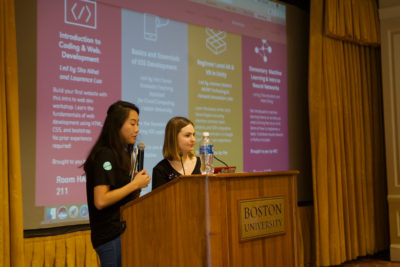
As Beyoncé’s songs blasted through the speakers of the Trustee Ballroom, women filled the room with eyes and minds set on computer coding, an ironic scene given the assumed male dominance in the field. “Each of you is an inspiration,” said Fiona Whittington, founder and president of Girls Who Code BU.
Last weekend, Girls Who Code BU, a club focused on the acceptance of women and diversity in the technology and coding industries, organized Boston University’s first all-female and femme nonbinary beginner’s hackathon, “Hack the Gap.”
Though hackathons are held in cities around the world all the time, the computer science industry is male-dominated, according to the National Science Foundation. The overarching goal of “Hack the Gap” was to break down the gender barrier in coding and attract more women to the tech industry, Whittington said.
“At the first hackathon I went to, the moment I walked in, a guy came up to me and asked me if I even coded,” said Whittington, a junior studying advertising and computer science. “That fueled my passion for all-female hackathons and why they’re so important.”
About 50 women attended “Hack the Gap” to participate and were placed in four to five person groups. Each team was given a mission to create an idea for a possible resource to help get more women to get involved with coding and technology. Their ideas were presented and voted on during the final hours of the hackathon.
Tracy Schroeder, vice president of BU’s Information Services and Technology and a keynote speaker at the hackathon, said women entering IT face a cultural barrier.
“A lot of people come into IT who don’t have STEM degrees but the cultural barrier there is high,” Schroeder said. “Women are just not encouraged to go in that direction.”
Her department, Schroeder said, has launched initiatives to diversify their workforce and get more women involved.
Currently, women are underrepresented in technological fields. According to the National Girls Collaborative Project, women occupy about 25 percent of positions having to do with computer and mathematical sciences.
“I’m looking for anything I can do to encourage women students to try it,” Schroeder said.
Attendee Michelle Lee, a freshman studying computer science in the College of Arts and Sciences, said she feels there hasn’t been enough progress in her field.
“In this society we should have made more progress and then you look at this one field and we’re still underrepresented,” Lee said. “[‘Hack the Gap’] is really welcoming because it’s any major with any experience.”
Part of the “Hack the Gap” experience included beginner workshops, held on Saturday at the Rafik B. Hariri Institute, which focused on basics in coding and web and software development. Participants learned how to cultivate a website with tools like HTML and CSS and were able to create apps in iOS. These helped to give these women an extensive and balanced foundation in the field of technology, according to Whittington.
“Anyone can learn how to code and the point of the event is to pursue that interest,” Whittington said. “Hackathons incorporate every field of technology and they’re a really great place to learn and meet new people.”
Bianca Oparaji, a freshman in CAS and the College of Fine Arts and another attendee, said the event’s focus on beginners was helpful.
“It does make it better, surrounded by people who have all been at that point,” Oparaji said.
Whittington said that there is real progress being made in the technology field for women, but there’s definitely room for improvement. Increased participation in events like “Hack the Gap,” Lee said, could help shift the tide in tech.
“Once we get students participating in these [we’ll see progress] because then people are making an effort to change,” Lee said.
Within Girls Who Code BU and events like “Hack the Gap,” Whittington said she hopes to help broaden the change. Girls Who Code BU is planning another all-female and femme nonbinary hackathon named “She Hacks Boston,” which Whittington referred to as “the largest all-female and non-binary hackathon in the world.” The event will be held in January.
“We can help grow the pipeline of women in technology,” Schroeder said.

















































































































Shari Ritter • Nov 5, 2017 at 2:06 pm
Proud to say the 2 tech integration specialists in my North Jersey school district are women!!